Posts by Christopher Lochhead
192 Stop Trying to Fit In!
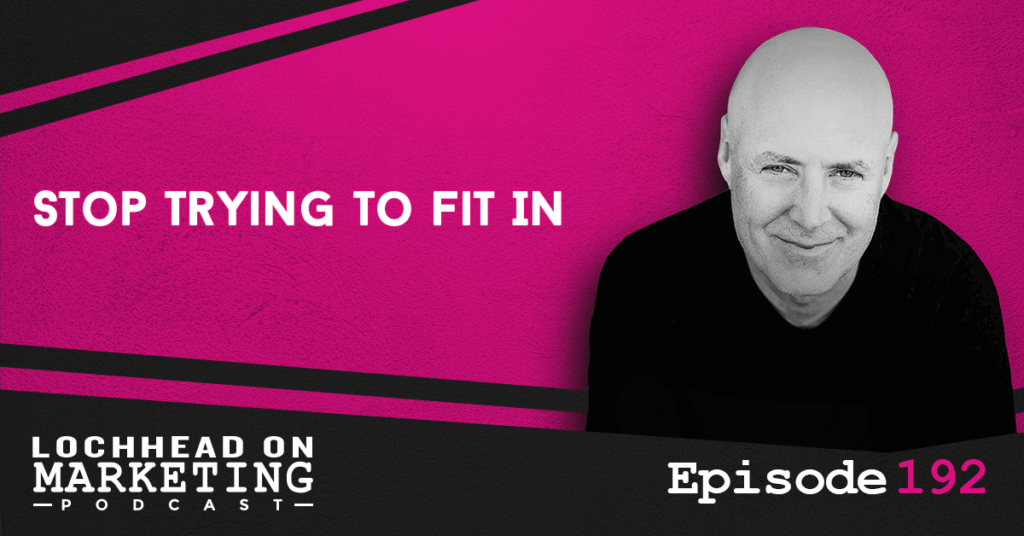
Podcast (lochheadonmarketing): Play in new window | Download (Duration: 10:49 — 7.4MB) | Embed
Subscribe: Apple Podcasts | Spotify | RSS | More
On this episode of Lochhead on Marketing, let’s talk about why it’s time to stop trying to fit in.
Welcome to Lochhead on Marketing. The number one charting marketing podcast for marketers, category designers, and entrepreneurs with a different mind.
Everyone Wants to Fit In
There’s an ongoing trend in the business, startup and marketing world of companies trying to fit in. There have been studies that indicate that among the B2B tech space, as many as 70% of the brands are blue.
This urge to fit in seems to stem from a combination of several factors. One of which is that companies are trying to compete in the same market, and they end up adopting marketing trends that seems to be working, which just makes them look like carbon copies of each other.
The second part is the current culture of people seemingly being offended by the simplest things, or if something does not align with their beliefs. So companies try to be as non-offensive as possible, which in turn just make their brand into something bland.
“The overall strategy in people’s marketing, and frankly, in many people’s careers, is to achieve Marriott lobby status. So what’s a Marriott lobby? Marriott lobby is nice; It’s very functional. It’s effective. And it’s bland. It’s forgettable. And nobody ever said, “Wow, that was a fucking legendary Marriott lobby.””
– Christopher Lochhead
The Primordial Need to Fit In
We get it: people have a primordial urge to stay in groups. We are pack animals, after all. Staying in a group is safe, staying in a group is comfortable. And having something in common lets us relate personally to a group, which is why marketing companies aim for those traits to relate to their market.
But at the end of the day, nobody legendary ever fit in. Because when you try to fit in, you become part of that whole, rather than something that defines it. And rather than companies trying to make their own markets and circles, they are being content in staying in the same circle, and competing for an ever-shrinking part of it, as more and more companies try to muscle their way in.
So be legendary, and start being different.
“And then I say fuck that, I’m going to follow my different. I’m going to focus on the things that are most meaningful to me, and most importantly, are going to make the biggest difference.”
– Christopher Lochhead
Bio
Don’t forget to grab a copy (or gift!) of one of our best-selling books:
Snow Leopard: How Legendary Writers Create A Category Of One
The Category Design Toolkit: Beyond Marketing: 15 Frameworks For Creating & Dominating Your Niche
A Marketer’s Guide To Category Design: How To Escape The “Better” Trap, Dam The Demand, And Launch A Lightning Strike Strategy
 The 22 Laws of Category Design: Name & Claim Your Niche, Share Your POV, And Move The World From Where It Is To Somewhere Different
The 22 Laws of Category Design: Name & Claim Your Niche, Share Your POV, And Move The World From Where It Is To Somewhere Different
We hope you enjoyed this episode of Lochhead on Marketing™! Christopher loves hearing from his listeners. Feel free to email him, connect on Facebook, Twitter, Instagram, and subscribe on iTunes!
347 Bouncing Back: Facing and Conquering Life’s Toughest Challenges with Combat Veteran Travis Mills
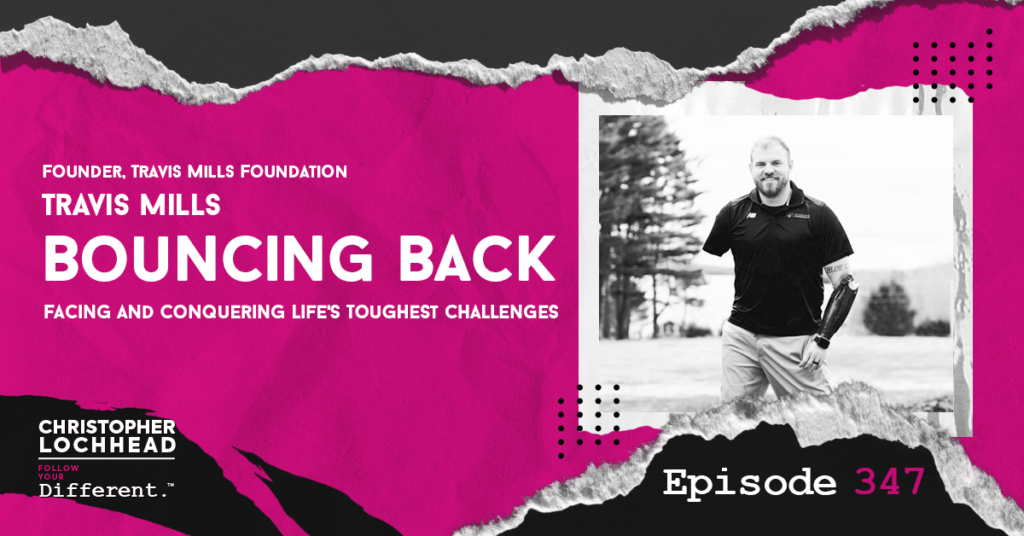
Podcast: Play in new window | Download (Duration: 1:11:35 — 49.2MB) | Embed
Subscribe: Apple Podcasts | Spotify | Pandora | RSS | More
We all encounter radical challenges, and we face big choices about how we approach life in the most challenging moments and learn to survive in – maybe even thrive. Today, we are joined by a combat veteran, retired US Army Staff Sergeant Travis Mills, as he shares his challenges and the choices he has made to get to where he is today.
Travis Mills is a serial entrepreneur, the driving force behind the Travis Mills Foundation, and the author of Bounce Back: A playbook for facing life’s toughest challenges with grace and gusto.
Make sure you listen all the way to the end. You don’t want to miss any of Travis’s unrelenting spirit, wisdom and humor.
You’re listening to Christopher Lochhead: Follow Your Different. We are the real dialogue podcast for people with a different mind. So get your mind in a different place, and hey ho, let’s go.
Travis Mills on his Military Service and Experience
Christopher starts off the conversation by inquiring about Travis’s motivation for joining the military.
Travis recounts feeling directionless after college, and was prompted by family advice to choose a military path for personal growth and benefits. Fascinated by infantry roles, Travis enlisted for a signing bonus.
He breezed through basic training due to his athletic prowess and later engaged in military ground fighting tactics, drawing on his childhood interest in karate. Despite his combat skills, Travis values self-control and notes the discipline instilled by martial arts.
Travis Mills on Mental Toughness
Travis reflects on being featured on a magazine cover for his mental toughness rather than physical appearance. He also appreciates the recognition for his foundation work. Christopher acknowledges the disparity between modeling and true toughness.
Travis also shares instances where he had to assert himself, highlighting his ability to de-escalate conflicts but also assert authority when needed. He explains how his military background balances his jovial persona, noting people’s tendency to underestimate him. He emphasizes the importance of professionalism and corrective measures in his businesses, showcasing his leadership style derived from his military experience.
From Military to Entrepreneurship
Christopher admires Travis’s entrepreneurship and proposes introducing him to Iron Mike Stedman, a fellow Marine and entrepreneur. Stedman’s mission involves helping inner-city kids through boxing and assisting veteran entrepreneurs with their businesses.
Travis expresses his belief in pursuing dreams and betting on oneself, citing personal experiences in entrepreneurship. Despite facing challenges, Travis advocates for seizing opportunities and embracing failure as a motivator. He shares his ventures in house flipping and marina ownership, emphasizing the importance of surrounding oneself with supportive people and taking calculated risks.
Travis’s resilience and clarity of purpose derived from his military background inform his entrepreneurial journey.
To hear more from Travis Mills and his journey and challenges from being in the military to being an entrepreneur, download and listen to this episode.
Bio
Born and raised in Vassar, Michigan, United States Army Staff Sergeant (Ret.) Travis Mills of the 82nd Airborne is a recalibrated veteran, motivational speaker, actor, author and an advocate for veterans and amputees. In addition to being the founder of the Travis Mills Foundation, Travis also serves as the President of the Board of Directors.
Travis has achieved his vision for the Foundation by bringing together a talented array of experts who masterfully accomplish the Foundation’s mission. Per Travis’s lead, the team at the Foundation are not only respected colleagues, they are family.
Links
Connect with Travis Mills!
Travis Mills Foundation | Instagram
We hope you enjoyed this episode of Christopher Lochhead: Follow Your Different™! Christopher loves hearing from his listeners. Feel free to email him, connect on Facebook, Twitter, Instagram, and subscribe on Apple Podcast / Spotify!
191 Gemini Can Testify It’s A Bland Rebrand!
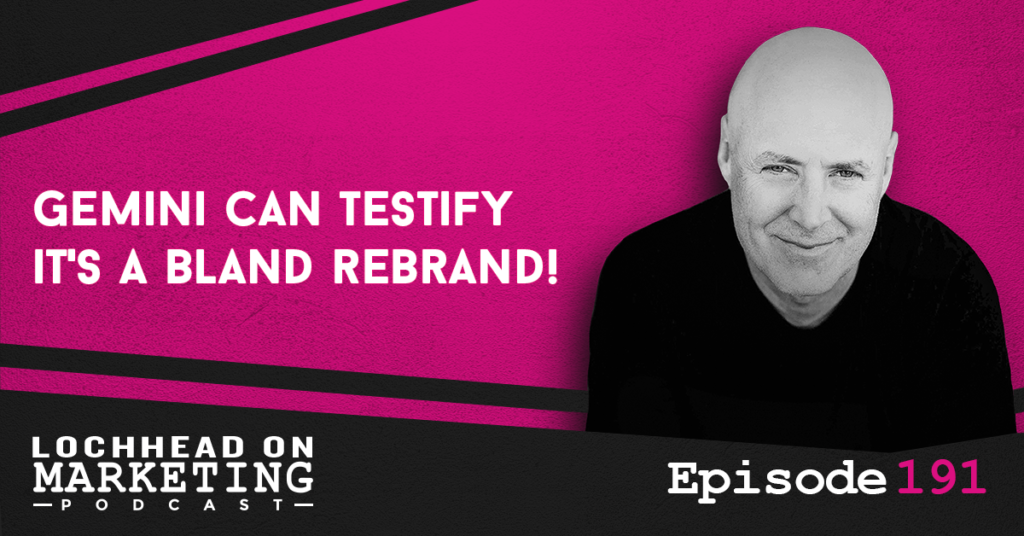
Podcast (lochheadonmarketing): Play in new window | Download (Duration: 12:28 — 8.6MB) | Embed
Subscribe: Apple Podcasts | Spotify | RSS | More
Today on Lochhead on Marketing, we talk about the good way and the bad way to rebrand. And wat better to use as an example than the recent Gemini AI rebrand by Google.
Welcome to Lochhead on Marketing. The number one charting marketing podcast for marketers, category designers, and entrepreneurs with a different mind.
The Good Reason to “Rebrand”
Before we proceed with the main topic at hand, let’s first have a good example of when to “rebrand”.
There’s a company called Chirp that sells foam rollers, which is used by athletes for training their muscles and easing soreness. But after some time, a new category was invented that was adjacent to their market, the percussion massager / gun.
Rather than just create their own version of percussion gun, Chirp went ahead and combined their foam rollers into this new category, essentially making a new category, the rolling percussive massager, for themselves.
The Bad Reason to “Rebrand”: Google’s Gemini
So why did we tell you that story? Because Google is doing the exact opposite of that, always going for the “Compete in the market” model rather than making their own market. And it could be seen with their latest endeavor in AI, Bard now rebranded as Gemini.
So, why did Google make this move? While we can’t say for certain, we can infer their motives. Essentially, they directly challenged ChatGPT and came up short. Now, they’re revamping Bard to give it a “fresh start.” While that might be their goal, most marketing experts would tell you that it simply looks like Google is backing away from the competition and trying to repurpose their AI to make the best of the situation.
That in itself is a problem, but there’s also the fact that Google doesn’t really do anything different than the reigning Category King of the market. This has been true with their forays in podcasts, social media, and their other services that are now defunct. They’re competing, instead of creating, which is what most companies do, and they’re fucked.
When to do a “Rebrand”
With that said, the best time to do a rebrand is if either you’re introducing a brand-new category as your main product, or revolutionizing one of your current ones by making a new category.
Rather than chasing after the tail of the Category Leader and competing for the remaining small chunk of the market, why not try doing something different? Because otherwise, you’ll just get your ass handed to you, just like what happened with Google Plus, Google Podcasts, and now, the unfortunate Google Gemini.
Bio
Don’t forget to grab a copy (or gift!) of one of our best-selling books:
Snow Leopard: How Legendary Writers Create A Category Of One
The Category Design Toolkit: Beyond Marketing: 15 Frameworks For Creating & Dominating Your Niche
A Marketer’s Guide To Category Design: How To Escape The “Better” Trap, Dam The Demand, And Launch A Lightning Strike Strategy
 The 22 Laws of Category Design: Name & Claim Your Niche, Share Your POV, And Move The World From Where It Is To Somewhere Different
The 22 Laws of Category Design: Name & Claim Your Niche, Share Your POV, And Move The World From Where It Is To Somewhere Different
We hope you enjoyed this episode of Lochhead on Marketing™! Christopher loves hearing from his listeners. Feel free to email him, connect on Facebook, Twitter, Instagram, and subscribe on iTunes!
346 Dating Over 40 with Nina Jarnum, author of “F*ck Kissing Frogs”

Podcast: Play in new window | Download (Duration: 1:14:30 — 51.2MB) | Embed
Subscribe: Apple Podcasts | Spotify | Pandora | RSS | More
It’s February, so what better time it is than to talk Love on Christopher Lochhead: Follow Your Different. Today, we have a fun one: a special dating episode for people over 40. And who better to talk about it than our guest, Nina Jarnum.
Nina Jarnum is a lawyer-turned-Yogi-turned-popular writer, and she’s the author of a new book called, “F*ck Kissing Frogs”. And we had a blast talking about her book and the topic of dating over 40, as you’ll hear in just a bit.
You’re listening to Christopher Lochhead: Follow Your Different. We are the real dialogue podcast for people with a different mind. So get your mind in a different place, and hey ho, let’s go.
Nina Jarnum on Kissing Frogs
Christopher jumps straight into it with the question of how many frogs do you have to kiss to find the one. Nina answers that if one is being smart about picking and dating, not as much as one would think.
Nina recounts her experiences in online dating, starting off with the bad impressions and stigma that people say online dating has to offer. But for the most part, Nina did not encounter those issues and had fun with online dating; which got her curious why a lot of people had a bad impression of it.
And so Nina asked her friends if she could check out their matches and update their profile, and some got better results from it soon after.
Nina Jarnum’s Online Dating Tips for Women
When asked about what is it that sets up a good profile from a bad one, Nina points out that having a good profile is like introducing yourself favorably to the other person. It’s a good way to share some information that shows what you are looking for in a person, but not so much that you’re sharing your life story.
Another tip that Nina gives is to be mindful of your profile pictures. Aside from the usual things to avoid like hiding in group photos and such, Nina suggests having at least one full-body picture on it, so that people have an idea of who they are meeting, and it’s also a good visual treat.
Nina also talks about avoiding using filters and other image-altering stuff in your profile, as it is a major turn-off for men to find out that they’re not meeting who they think they were supposed to meet based on the profile.
“Don’t put filter on your photos. Every man I have spoken to about this have been like, their pet peeve is turning up on a date and not being able to recognize the person is such a turnoff. I like comparing it to as a woman when you go on a date with a man and his profile says he’s 6’5”, and he turns up and he’s 5’7”. It’s not cool.”
– Nina Jarnum
Nina Jarnum on Dating Preferences and Honesty
Following that line of thought, Nina adds that not only is it an awkward encounter at the very beginning of the date, it sets a bad impression and precedent right from the start that you are lying about something. She explains that while trying to appeal to the general consensus of what a “good-looking” guy or gal sounds seems like the way to go, the whole point of online dating is to find someone that likes you that you might also like, and not the other way around.
That said, there will always be preferences on people that you like, but Nina suggests that you don’t overly limit yourself to those preferences, because you might be missing out. One common thing that she points out is about people’s height; as some would not even consider dating someone who is below a certain number.
The point is, sampling out of your comfort zone is fine once in a while, especially if your current pool is not turning out the results that you want. You might end up finding that great date from someone you didn’t expect.
To hear more from Nina Jarnum and more dating tips for people over 40, download and listen to this episode.
Bio
Nina Jarnum is a mother, a lover and a world explorer. She was born and raised in Denmark, moved to England in her twenties where she graduated law school.
Nina has taught yoga, breath work and mindfulness all over the world, has written for major fitness magazines and worked with “Start Today” for the Today Show. She uses her knowledge and experience as mindfulness teacher to help people on a conscious journey of healthy dating.
Nina believes that authenticity, self-care, a willingness to be uncomfortable and most of all gratitude is the secret to not just finding love but also a happy life.
Links
Connect with Nina Jarnum!
Instagram | Twitter / X | F*ck Kissing Frogs
We hope you enjoyed this episode of Christopher Lochhead: Follow Your Different™! Christopher loves hearing from his listeners. Feel free to email him, connect on Facebook, Twitter, Instagram, and subscribe on Apple Podcast / Spotify!
190 How To Have A Legendary Career In Marketing with Ryan Alford of The Radcast
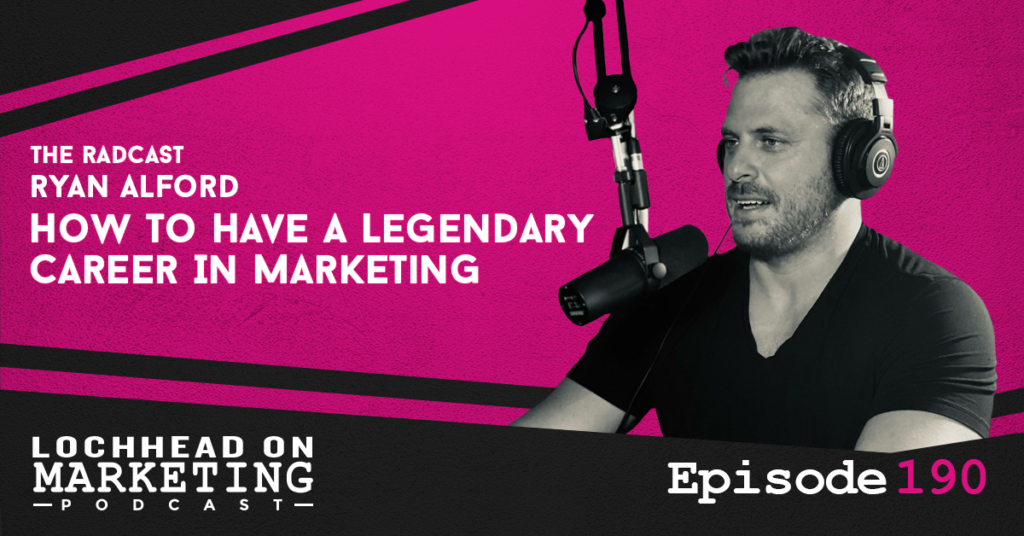
Podcast (lochheadonmarketing): Play in new window | Download (Duration: 1:02:23 — 42.8MB) | Embed
Subscribe: Apple Podcasts | Spotify | RSS | More
On this episode of Lochhead on Marketing, we have a very special episode with one of my favorite marketers, Ryan Alford.
Ryan Alford runs a digital marketing agency called Radical Marketing. He also has a great marketing podcast that I’ve been stoked to be a guest on called The Radcast, which is a top 25 Business and Marketing podcast. He’s just one of those guys I like talking about marketing with.
Today, we are going to talk about how to have a legendary marketing career. We also talk about why it is that many people in Marketing don’t view what they do as a craft that they’re working on their whole lives, and what happens when you do so.
Welcome to Lochhead on Marketing. The number one charting marketing podcast for marketers, category designers, and entrepreneurs with a different mind.
Ryan Alford on Marketing Careers and Current Industry Trends
Christopher and Ryan discuss the appeal of marketing careers, especially for younger individuals.
Ryan, with 20 years of experience, emphasizes the importance of creative thinking and adaptation in the face of industry changes like AI. He believes marketing offers opportunities for innovation and creativity, essential for standing out amidst a crowded field.
Christopher adds that many marketers don’t view their work as a craft, but rather as a job or set of skills, contrasting it with master surfboard shaping. Ryan, drawing on his own experience, sees marketing as a craft that requires honing skills over time, akin to his father’s craftsmanship. Both agree that when you love what you do, it doesn’t feel like work.
Ryan Alford on Marketing Skills and Adapting to Platform Changes
The two then discuss the evolving landscape of marketing skills and the need for adaptability. They highlight the importance of curiosity, continuous learning, and embracing change in navigating the industry’s shifts.
With the proliferation of digital platforms, they emphasize the challenge of staying updated and the risk of relying too heavily on platforms beyond marketers’ control. Despite these challenges, they underscore the enduring power of innovative ideas to capture attention and drive success. Christopher also cautions against shallow tactics focused solely on grabbing attention without meaningful content, using the wind feather in car dealerships and mall entrances as an example.
They advocate for a balance between leveraging new platforms and maintaining focus on substantive messaging to achieve marketing goals effectively.
Ryan Alford on Marketing Strategies and Generating Outcome
Christopher and Ryan discuss the importance of marketing strategies producing meaningful outcomes rather than mere attention-grabbing tactics. They emphasize the necessity of tying marketing efforts to revenue generation, highlighting the distinction between visibility campaigns and those that drive sales.
Ryan stresses that successful marketers focus on moving consumers from one perception to another, ultimately leading to sales.
They acknowledge the controversy surrounding this viewpoint, especially among marketers who resist being held accountable for tangible results.
Both agree that marketing is for those who embrace accountability and are committed to producing revenue, with Christopher noting that marketing allows for creative ideation that triggers sales, contrasting with the more direct approach of salesmanship.
To hear more from Ryan Alford and learn how to have a legendary career in Marketing, download and listen to this episode.
Bio
Links
Connect with Ryan Alford!
We hope you enjoyed this episode of Lochhead on Marketing™! Christopher loves hearing from his listeners. Feel free to email him, connect on Facebook, Twitter, Instagram, and subscribe on iTunes!
345 Learned Excellence: Legendary Lessons from Navy SEALs, CEOs, Pro Athletes & Big Wave Surfers with Dr. Eric Potterat & Alan Eagle
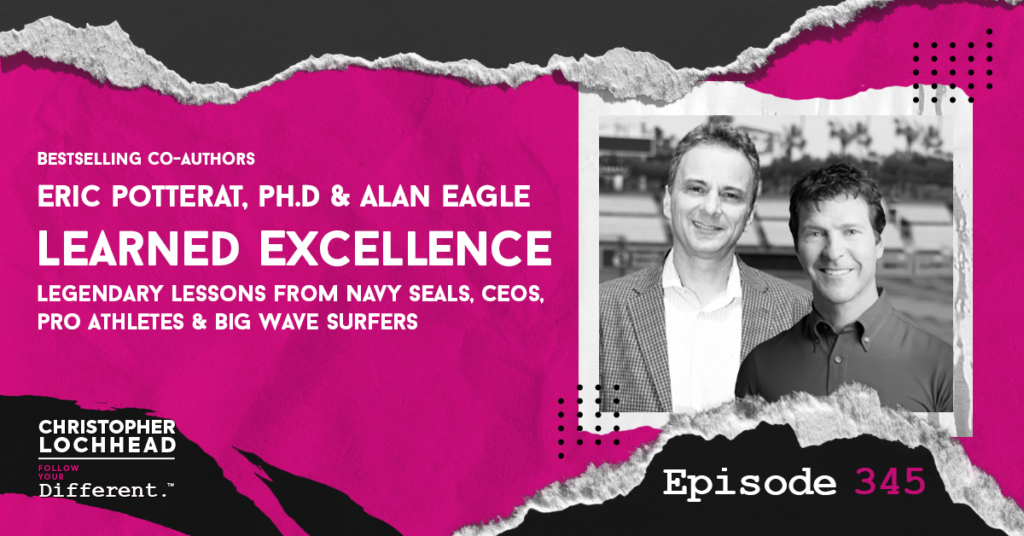
Podcast: Play in new window | Download (Duration: 1:31:00 — 62.5MB) | Embed
Subscribe: Apple Podcasts | Spotify | Pandora | RSS | More
This episode is exclusively for people who want to have a personal breakthrough in their own performance. And who better to discuss it with but with people who have learned excellence, Dr. Eric Potterat & Alan Eagle.
Alan Eagle is an executive Communication Coach, and he spent 16 years working with a top people at Google. He’s written several other books, and his most well-known for his celebrated book, “Trillion Dollar Coach” about the legendary Silicon Valley coach Bill Campbell.
Dr. Eric Potterat is a clinical and performance psychologist, and he was with the US Navy for over 20 years as a commander. On the last 10 years of Eric’s career. he was the head psychologist for the US Navy SEALs globally.
To say that these two know a little bit about how the top performers in the world do what they do is a radical understatement. And on this episode, we get into all of it, we pop the hood to go deep on their new book learned Excellence, which I highly recommend you pick up a copy of.
You’re listening to Christopher Lochhead: Follow Your Different. We are the real dialogue podcast for people with a different mind. So get your mind in a different place, and hey ho, let’s go.
Dr. Eric Potterat and Alan Eagle on Maintaining One’s Mental Health in a Chaotic World
Christopher, Alan and Dr. Eric opens the discussion on how they maintain their mental health with all the crazy things happening around all of us.
Christopher highlights the overwhelming challenges globally, from political divisiveness to wars and rising anti-Semitism. Dr. Eric emphasizes the importance of focusing on what individuals can control, citing attitude, effort, and behavior within their circle. Alan adds that staying informed is crucial, but he discourages excessive complaining, urging people to think about actionable steps rather than mere criticism.
“I can’t stand the complainers. Okay, if you’re going to take a position, great! Then I would think through, “what can you do?””
– Alan Eagle
The three then get into how the struggle of balancing engagement with the world and avoiding emotional overload, especially in the face of potentially troubling events in the upcoming years.
Dr. Eric Potterat and Alan Eagle on Mindset, Organizational Culture, and Sustained Excellence in Baseball
Christopher, Alan, and Dr. Eric then talk about maintaining a good mindset in spite of challenges along the way.
Dr. Eric talks about the concept of agency, and how to distinguish between victims, survivors, and thrivers, advocating for the latter by practicing agency and embracing post-traumatic growth.
Alan underscores the importance of choosing a mindset and shares his experience with the Dodgers, highlighting the team’s systemic approach and organizational mindset. Dr. Eric credits the Dodgers’ sustained excellence to a focus on hiring talented individuals, providing necessary tools, and maintaining a process-oriented approach.
Process and Mental Toughness in Entrepreneurship
They then discuss the crucial role of process and mental toughness in entrepreneurship. Christopher draws from Michael Gerber’s “The E Myth,” highlighting how successful franchises attribute their triumph to well-defined processes, contrasting with small businesses’ failure due to a lack of systematic approaches.
Dr. Eric identifies process as a pillar of mental toughness, emphasizing its role among the five pillars discussed in their book.
Alan Eagle also shares insights from Silicon Valley, underscoring the balance between process and visionary chaos at Google, which contributed to its innovative success.
To hear more from Dr. Eric Potterat and Alan Eagle on how to learn excellence, download and listen to this episode.
Bio
Eric Potterat, PhD, is a clinical and performance psychologist and a leading expert in individual and organizational performance optimization. He retired as a commander from the US Navy after twenty years of service, during which he helped create the mental toughness curriculum used during Navy SEALs BUD/S training.
Dr. Eric spent several years as the director of specialized performance for the Los Angeles Dodgers and has also worked with Red Bull athletes, the US Women’s national soccer team, the Miami Heat, and numerous Olympic athletes, first responders, business leaders, and NASA astronauts.
Alan Eagle is an author and executive communications consultant, helping leaders and companies shape and tell their stories. He spent 16 years at Google, partnering with executives to communicate the company’s story to clients, partners, employees, and the public.
Alan is the co-author of the books How Google Works and Trillion Dollar Coach, and the author, all by himself, of seven letters-to-the-editor published in Sports Illustrated. He has never won the New Yorker Caption Contest.
Links
Connect with Dr. Eric Potterat & Alan Eagle!
Dr. Eric LinkedIn | Alan LinkedIn | Learned Excellence
We hope you enjoyed this episode of Christopher Lochhead: Follow Your Different™! Christopher loves hearing from his listeners. Feel free to email him, connect on Facebook, Twitter, Instagram, and subscribe on iTunes!
189 The Big Distribution Lie
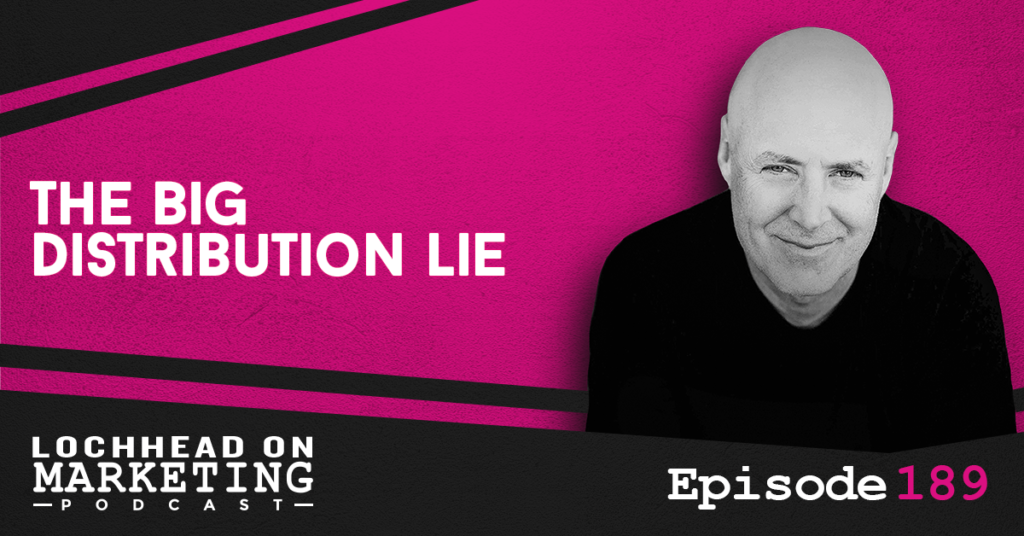
Podcast (lochheadonmarketing): Play in new window | Download (Duration: 7:07 — 4.9MB) | Embed
Subscribe: Apple Podcasts | Spotify | RSS | More
Happy new year to everyone, and we at Lochhead on Marketing hope that you’ve been having a good one so far. To start off the year, let us talk about the big Distribution Lie, why it is so, and what you really need for your new startup or project to make it big.
You see, in Silicon Valley, there has been an ever-increasingly large drumbeat that says the number one thing that a startup needs or that a new software launch of any kind needs is distribution. That if you can only get distribution, then you’d win, right? So, let’s test this.
Welcome to Lochhead on Marketing. The number one charting marketing podcast for marketers, category designers, and entrepreneurs with a different mind.
The Myth of Distribution as a Key to Success
For this discussion, let us use Google as an example. In 2018, Google launched Google Podcast as a competitor to the category king (Apple), and the current challenger (Spotify). On paper, Google Podcast should have the advantage: Google has a legendary distribution line with its 5 billion users and having a mailing and browsing platform that is widely popular worldwide.
And yet for some reason, Google Podcast is now at the brink of closing down in 2024. So why did it not beat out the category king, much less its challenger in this race?
Building the Category versus Muscling into the Market
Simply put, Google Podcast did not offer anything new that Apple Podcast or Spotify doesn’t already do. It was simply relying on the fact that on paper, it looks like the better product with a well-established distribution network to back it up.
Whereas Apple created the category, designed the space, and solved the “problem” that their product “solves”, thus cornering a big chunk of the market.
This is a mistake that happens over and over and over again, category design economics are clear, the company that designs the space is best positioned to dominate it and by dominated our primary research has shown that the company that designs the category, if they can execute over time, earns 76% of the total value created.
Doomed to Repeat Itself
Unfortunately, this is not the first time this has happened to Google. One big thing most people might remember is Google Plus, which was supposed to take down Facebook. And not only Google is susceptible to this, as different big tech companies have committed this mistake, because they believe they could just use their better distribution systems to take over a market, rather than creating their own to dominate.
So at the end of the day, no matter how good your product is, and how great your distribution advantage is: if you don’t design a new category, around a problem that matters to customers, it doesn’t matter how legendary your product is.
Bio
Don’t forget to grab a copy (or gift!) of one of our best-selling books:
Snow Leopard: How Legendary Writers Create A Category Of One
The Category Design Toolkit: Beyond Marketing: 15 Frameworks For Creating & Dominating Your Niche
A Marketer’s Guide To Category Design: How To Escape The “Better” Trap, Dam The Demand, And Launch A Lightning Strike Strategy
 The 22 Laws of Category Design: Name & Claim Your Niche, Share Your POV, And Move The World From Where It Is To Somewhere Different
The 22 Laws of Category Design: Name & Claim Your Niche, Share Your POV, And Move The World From Where It Is To Somewhere Different
We hope you enjoyed this episode of Lochhead on Marketing™! Christopher loves hearing from his listeners. Feel free to email him, connect on Facebook, Twitter, Instagram, and subscribe on iTunes!
344 Product, Growth, and Career Advice with Lenny Rachitsky
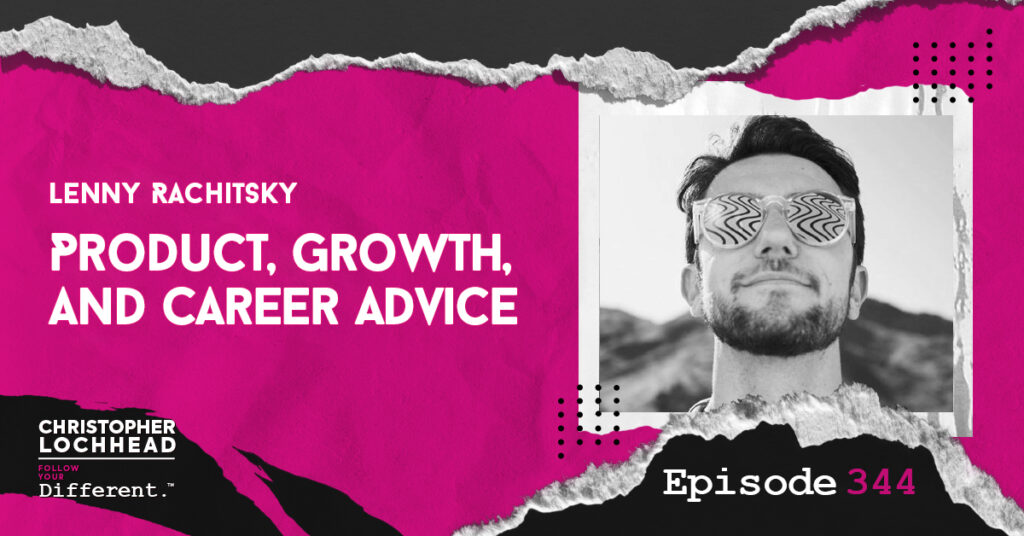
Podcast: Play in new window | Download (Duration: 1:03:41 — 43.7MB) | Embed
Subscribe: Apple Podcasts | Spotify | Pandora | RSS | More
On this episode of Christopher Lochhead: Follow Your Different, we are joined by one of my favorite people in the creator world, Lenny Rachitsky. A few episodes back, we posted the conversation we had on Lenny’s Podcast were I also extended an invite to him for a dialogue at Follow Your Different. And now, here we are.
Lenny Rachitsky specializes in deeply researched product growth and career advice, particularly for those in the startup/tech world. Lenny’s newsletter on Substack is also the number one paid business Substack. Try as we might with Category Pirates, we’ve been unable to catch him, and I think that’s great.
There are some powerful learnings here for marketers, and creators, and really anybody who wants to design a legendary career, I think you’re going to absolutely love this very special conversation with Lenny.
You’re listening to Christopher Lochhead: Follow Your Different. We are the real dialogue podcast for people with a different mind. So get your mind in a different place, and hey ho, let’s go.
Lenny Rachitsky on Product Management and Growth Strategies
The conversation begins with Christopher praising Lenny’s approach to product management and growth, hailing him as the “category King.” They then discuss the value of staying broad versus niche in product management, with Lenny expressing admiration for specific experts like Emily Kramer in marketing.
Christopher commends Lenny for his unique, non-egotistical approach in a field filled with “hustle porn stars.” Lenny attributes his success to providing genuine value rather than chasing followers. Christopher perceives a cohesive through line in Lenny’s work, suggesting a continuous quest to answer key questions for founders and product builders.
Lenny elaborates on his goal of addressing a broad range of questions in product management and growth, emphasizing a core focus with intersecting adjacencies like career and leadership.
Creating Valuable Content through Practical Application of Ideas
Lenny continues to discuss his approach on content creation, emphasizing the importance of maintaining diverse interests to keep himself engaged. Christopher Lochhead praises Lenny for incorporating varied topics into his work, appealing to a broader audience beyond the core niche of product management.
From there, they explore the concept of obvious and non-obvious content, with Lenny acknowledging the practical nature of his content. Christopher notes the challenge of balancing obviousness with depth, expressing his preference for content that goes beyond the blatantly evident. Despite categorizing Lenny’s content as somewhat obvious, Christopher commends him for avoiding the realm of “stupid obvious,” recognizing the valuable and practical applications within Lenny’s work.
Lenny Rachitsky on Creating Quality Content
Following up on this, Christopher questions Lenny Rachitsky on creating smart, obvious, and practical content without it being overly simplistic.
Lenny attributes his success to maintaining a high bar for quality, ensuring content is not overly obvious or uninteresting. He emphasizes spending extensive time on each post, sometimes up to 100 hours, and credits his ability to dedicate full time to content creation as a significant advantage.
Lenny describes a flywheel effect where initial success allows more time for improvement, creating a cycle of growth. He suggests that anyone can follow this model if they find the time and opportunities to invest in their content.
To hear more from Lenny and his ideas and thoughts on business content creation, download and listen to this episode.
Bio
Lenny Rachitsky (author of #1 business newsletter on Substack with 500k+ subscribers) interviews world-class product leaders and growth experts to uncover concrete, actionable, and tactical advice to help you build, launch, and grow your own product.
Links
Connect with Lenny Rachitsky!
Lenny’s Website | Lenny’s Podcast | Twitter/X | LinkedIn
We hope you enjoyed this episode of Christopher Lochhead: Follow Your Different™! Christopher loves hearing from his listeners. Feel free to email him, connect on Facebook, Twitter, Instagram, and subscribe on iTunes!
343 Miracle Morning / Miracle Life with Hal Elrod, multi-million bestselling author
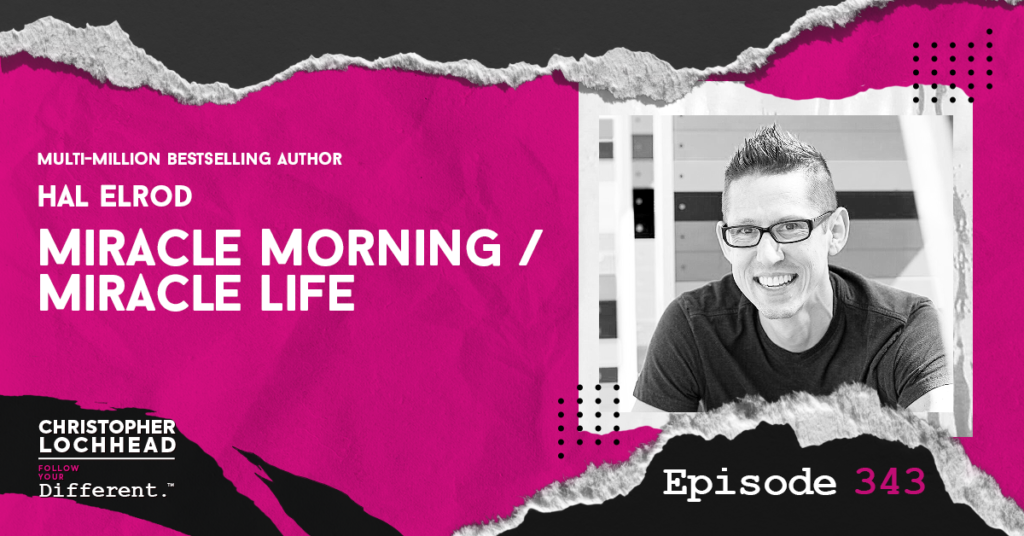
Podcast: Play in new window | Download (Duration: 1:06:34 — 45.7MB) | Embed
Subscribe: Apple Podcasts | Spotify | Pandora | RSS | More
It is now 2024; and as they say, a new year, a new you. So let us start you off by helping you gain a new lens and perspective on things. And who better to assist you on that than our guest, Hal Elrod.
In the world of kind of personal growth and personal development, Hal Elrod stands alone. He’s recently released a new updated and expanded version of the Miracle Morning. To say that Hal Elrod has created a movement would be putting it mildly.
On this episode, you get to enjoy an extraordinary conversation with this man.
You’re listening to Christopher Lochhead: Follow Your Different. We are the real dialogue podcast for people with a different mind. So get your mind in a different place, and hey ho, let’s go.
Hal Elrod on Spirituality and Personal Growth after Traumatic Events
Hal Elrod talks about his journey of overcoming cancer and the cognitive challenges caused by chemotherapy. He shares that he has found himself struggling to finish books because he takes longer to process and comprehend what he was reading, or he forgets what has happened one or two chapters before and ends up rereading them again.
They then delve into Hal’s spiritual growth post-trauma, exploring his Catholic upbringing and exploration of various religions. Hal emphasizes an inclusive perspective, viewing different faiths as attempts to understand a higher power. He describes a personal and intimate relationship with God, finding solace and strength through prayer.
Hal reflects on the usefulness of belief and shares instances where prayer manifested specific outcomes, reinforcing his faith in a higher power.
Hal Elrod on Faith, Personal Development, and Empathy in a Broken World
When asked, Hal Elrod acknowledges his connection to Christianity but emphasizes a nuanced belief, focusing on embodying Jesus Christ’s teachings rather than subscribing blindly.
Christopher appreciates the authenticity of Hal’s answer, asserting that being a good person matters more than religious labels. Christopher shares a personal perspective on faith, stating that being a good person transcends religious affiliations. He mentions a song by Aaron Lewis that explores everyone talking to God in challenging times, highlighting the universal inclination towards faith during hardships.
This reflects a shared belief in the importance of personal development and empathy over rigid religious definitions in navigating life’s challenges.
Miracle Mornings & Focusing on Personal Growth during Uncertain Times
Christopher praises Hal Elrod’s impactful work on personal development, particularly the Miracle Morning routine. He notes the challenging times, referencing global issues, economic struggles, and personal hardships.
Hal shares some of his insights from 2020, emphasizing the importance of focusing on what’s within one’s control to maintain mental well-being. He highlights the Miracle Morning as a powerful tool for daily self-improvement and resilience, especially during chaotic periods.
Hal underscores the correlation between feeling out of control and the necessity of self-care. Ultimately, he advocates for concentrating on personal growth, stating that inner peace contributes to a better world, emphasizing the responsibility individuals have to themselves and those around them in tumultuous times.
To hear more from Hal Elrod and how to live have your own Miracle Mornings, download and listen to this episode.
Bio
Hal Elrod is on a mission to Elevate the Consciousness of Humanity, One Person at a Time. As the author of one of the highest rated books on Amazon, “The Miracle Morning” (which has been translated into 37 languages, has over 3,000 five-star reviews and has impacted the lives of over 2,000,000 people in more than 70 countries) … he is doing exactly that.
What’s incredible is that Hal literally died at age 20. His car was hit head-on by a drunk driver at 70 miles per hour, his heart stopped beating for 6 minutes, he broke 11 bones and woke up after being in a coma for 6 days to be told by his doctors that he would probably never walk again.
Not only did Hal walk, he ran a 52-mile ultra-marathon and went on to became a hall of fame business achiever, international keynote speaker, author, and grateful husband & father-all before he turned 30.
Then, in November of 2016, Hal nearly died again – his kidneys, lungs, and heart were failing, and he was diagnosed with a rare, and very aggressive form of cancer and given a 30% chance of living.
After enduring the most difficult year of his life, Hal is now cancer-free and furthering his mission as the founder of The Miracle Morning book series, host of the “Achieve Your Goals” podcast, creator of the Best Year Ever [Blueprint] LIVE event, and Executive Producer of The Miracle Morning MOVIE – a documentary that reveals the morning rituals of some of the world’s most successful people.
Hal is grateful to be alive and living his mission alongside his wife and their two young children in Austin, TX.
To contact Hal about media appearances, speaking at your event, or if you just want to receive free training videos and resources, visit www.HalElrod.com.
Links
Connect with Hal Elrod!
Hal’s website | Miracle Morning
We hope you enjoyed this episode of Christopher Lochhead: Follow Your Different™! Christopher loves hearing from his listeners. Feel free to email him, connect on Facebook, Twitter, Instagram, and subscribe on iTunes!

